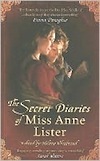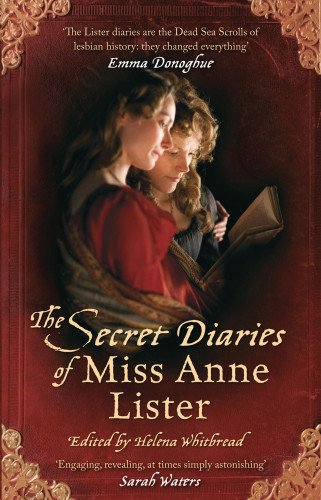 The Secret Diaries of Miss Anne Lister
The Secret Diaries of Miss Anne Lister
Edited by Helena Whitbread
Virago, UK. 422 pages, $14.95
A SECRET DIARY—seduction, romance, lesbian love, sexual passages written in code—are all packaged in this one volume that chronicles the life of a most extraordinary 19th-century English gentlewoman, Anne Lister (1791–1840). Helena Whitbread, the editor of these diaries, has painstakingly decoded and transcribed the entries. She offers an excellent introduction to the book with historical background as well as a discussion of her involvement with the diaries.
Anne Lister started her diaries in 1806 but didn’t really start writing detailed entries until 1808. This volume concentrates on the years from 1816 to 1824. Lister wrote in depth about her private life and loves. She resorted to code—“crypthand” rather than “plainhand,” in her words—whenever she wrote about sexual intimacies with her lovers. In an entry dated January 29, 1821, she wrote: “I love, & only love, the fairer sex & thus beloved by them in turn, my heart revolts from any other love than theirs.” Lister came from a family of landowners, the Listers of Shibden Hall, Halifax, West Yorkshire. Her entries are windows into her daily life: visits with friends, the affairs of her estate, weather concerns, discussions on local and international news. She describes specific meals, indigestion, and the necessity of using leeches to cure whatever ails you!
Although rather conservative and an avowed monarchist, Lister cut quite an eccentric figure for the times. Often dressed in black, many thought her a man dressed as a woman. On September 17, 1818, she wrote that “some men and women declared I was a man.” Unlike other women of the times who devoted themselves to learning the domestic arts, Lister learned Greek, Latin, and mathematics. She played the flute. She concerned herself with politics. She was the first woman elected to the Halifax Literary and Philosophical Society. She loved to travel.
Her two most important love relationships were with Isabella Norcliffe (Tib) and Marion Lawton (née Belcombe). She chronicled her involvement with each woman throughout her diaries. Marion, the “love of her life,” ended up marrying Charles Lawton in order to gain financial security. Despite the marriage, Anne and Marion maintained a longstanding sexual relationship. When Marion contracted a venereal disease from her husband, Anne also became infected, and she documented the course of the illness in her diaries. Her relationship with Isabella (“Tib”) was less passionate. Tib was an alcoholic and jealous of Anne’s relationship with Marion. After several years, Lister distanced herself from Isabella.
Lister frequently wrote things like: “I cannot live happily without female company, without someone to interest me” (Tuesday, September 8, 1818). In 1822, she visited the Ladies of Llangollen—Lady Eleanor Charlotte Butler (1739–1829) and Sarah Posonby (1755–1832)—who lived with each other in “platonic friendship” in a simple bucolic setting. Such luminaries as William Wordsworth, Percy Bysshe Shelley, and Lord Byron visited and paid homage to the two “Ladies,” who denied that their relationship had any sexual component. However, after visiting with them, Lister concluded that the women were lovers, writing (on Saturday August 3, 1822): “I cannot help thinking that surely it was not platonic.”
Lister’s life changed dramatically in 1824 when she decided to travel the continent and beyond, and she distanced herself further from Marion and Isabella. The diaries in this volume end in that year. Thereafter Lister maintained platonic relationships with both Marion and Isabella. Lister also managed to find a companion, Ann Walker, with whom she lived and traveled. In 1840, Lister died of a fever while on a trip to Koutaisi, Georgia.
Whitbread has done fine work as editor of these diaries. Her notes provide a wealth of supplementary information about her subject. The diaries are essential reading for anyone who’s interested in the history of women’s sexuality. A lost document of lesbian history has been recovered from obscurity.






